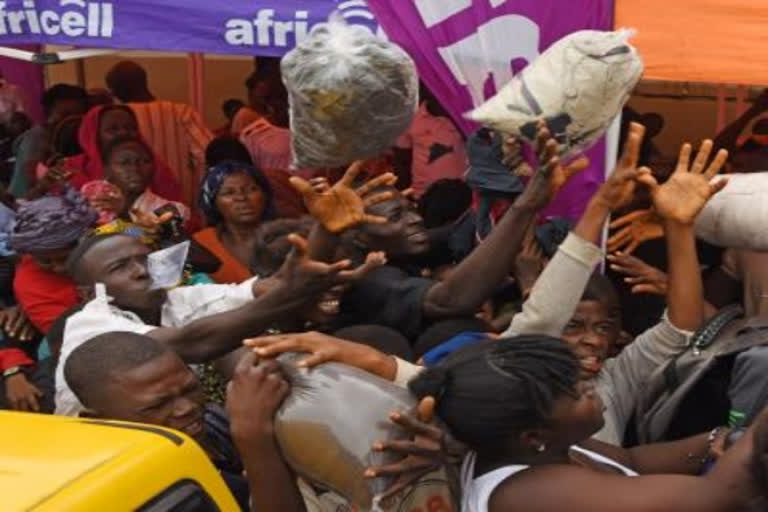United Nations: In addition to increasing needs, continued fighting in northern Ethiopia -- including airstrikes -- affects the means to deliver that relief, the UN Office for the Coordination of Humanitarian Affairs (OCHA) has said. The office added that airstrikes have been intensifying in several Tigray region locations since the start of the year, reportedly causing significant civilian casualties. Aid partners temporarily restricted their movement and activities in northwestern Tigray, except for Shire town, due to the airstrikes. Once some aid movement resumed, the office said the lack of fuel severely limited the response, Xinhua news agency reported.
"Fighting around Abala, on the Tigray-Afar border, is hindering our ability to bring aid into Tigray. There have been no deliveries of assistance into Tigray since December 14."
No fuel trucks have entered the Tigray region since August 2, 2021, OCHA said, meaning that many humanitarian partners are mainly working close to urban areas with little or no travel outside. The office added that relief organisations providing food assistance do not have enough fuel to distribute even the limited food stocks available in Tigray. Organisations providing nutrition assistance warn that activities will soon stop without additional fuel. Humanitarians repeatedly plead that 100 aid trucks are needed daily for Tigray relief.
While insecurity also constrains humanitarian operations in parts of the neighbouring Amhara region, the relief response is scaling up as more areas become accessible, OCHA said. United Nations and non-governmental organisations partners provided food to more than 250,000 people last week. The office added that more than 47,000 people also received emergency shelter and non-food items in the past week. At least a few hundred thousand displaced people are estimated to have returned to their homes over the last three weeks. They reportedly need essential assistance and emergency shelter support.
In the Afar region, east of Tigray, the humanitarian response continues with about 330,000 people provided with food assistance in the current distribution round, OCHA said.
Meanwhile, the government of Ethiopia has sent a letter to the World Health Organization, accusing its Ethiopian director-general of “misconduct” after his sharp criticism of the war and humanitarian crisis in the country. Ethiopia nominated Tedros Adhanom Ghebreyesus to be the head of the U.N. health agency four years ago, but says he has “not lived up to the integrity and professional expectations required from his office,” accusing him of interfering in Ethiopia's internal affairs, according to a press release issued late Thursday. “Through his acts, (Tedros) spread harmful misinformation and compromised WHO's reputation, independence and credibility,” Ethiopia's ministry of foreign affairs said.
WHO had no immediate response to the claims.
Tedros, an ethnic Tigrayan, has repeatedly deplored the situation in his home country and called for humanitarian access to the conflict-ridden region of Ethiopia. “Nowhere in the world are we witnessing hell like Tigray,” said Tedros at a media briefing Wednesday. He cited a missive WHO had received recently from a physician in the region, who said health authorities had run out of basic medicines for diseases including diabetes in June and were now using expired stocks and intravenous fluids. Health officials in the Tigray capital have described the same to The Associated Press.
Tedros condemned Ethiopia's blockade of international access to Tigray, saying that WHO had not been allowed to send any supplies to the region since July, noting the U.N. agency had access to Syria and Yemen even during their worst conflicts.
He said there should be “unfettered” humanitarian access to Tigray and said that “just respecting the constitutional order ”would bring this problem into a peaceful conclusion."
He continued: “Of course, I am from that region and from the northern part of Ethiopia. But I am saying this without any bias.”
The Ethiopian government said Tedros was using his office “to advance his political interest at the expense of Ethiopia” and said he continues to be an active member of the Tigray People's Liberation Front; Tedros was foreign minister and health minister when the TPLF dominated the country’s ruling coalition. The TPLF, the political party that runs the Tigray region, has been clashing with Ethiopian federal forces since the country’s Nobel Peace Prize-winning prime minister accused the heavily armed regional government of attacking a military base. Each government regards the other as illegitimate after a months-long falling-out amid political reforms.
On Friday, the U.N. World Food Program warned its food assistance in northern Ethiopia is “about to grind to a halt because intense fighting has blocked the passage of fuel and food." No WFP convoys have reached the Tigray capital since mid-December, it said in a statement, “and the last of WFP’s cereals, pulses and oil will be distributed next week.” Stocks of nutritionally fortified food to treat malnourished children and women are depleted, it said. “We’re now having to choose who goes hungry to prevent another from starving,” said Michael Dunford, WFP’s regional director for Eastern Africa, calling for safe humanitarian corridors on all routes across northern Ethiopia. The WFP says nearly 10 million people need food assistance.
In a separate statement on the war, the U.N human rights office said at least 108 civilians have reportedly been killed in Tigray this year by airstrikes “allegedly carried out by the Ethiopian air force.” It warned of possible war crimes. The airstrikes have continued despite a shift in the war in recent weeks, with the Tigray forces retreating into their region and Ethiopian forces saying they wouldn't pursue them further there. Meanwhile, Prime Minister Abiy Ahmed has spoken of reconciliation and national dialogue.
(agencies input)
